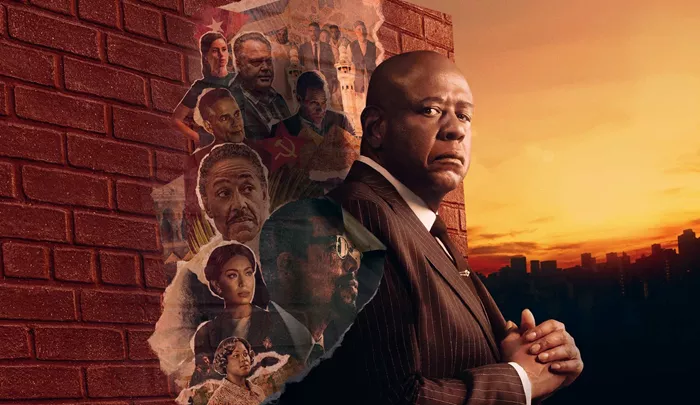Since its debut in 2019, Godfather of Harlem has rapidly established itself as a standout in the crime drama genre. With gripping storytelling, nuanced character portrayals, and a rich historical backdrop, the series has earned high praise from both audiences and critics alike. More than just a crime saga, it explores the intersections of race, politics, and society during a turbulent era in Harlem’s history.
Created by Chris Brancato and Paul Eckstein, the show continues to air new seasons, steadily expanding its influence and narrative depth. Loosely based on the real-life figure of Bumpy Johnson, a notorious Harlem mob boss, the series chronicles his rise and struggles to reclaim power after his release from prison. Forest Whitaker’s powerful performance as Bumpy Johnson breathes life into the complex character, making him one of television’s most memorable antiheroes.
How Does Godfather of Harlem Bring Harlem’s Crime World to Life?
Set in the 1950s and 1960s, Godfather of Harlem vividly recreates the social and criminal landscape of one of New York City’s most iconic neighborhoods. Bumpy Johnson not only controlled much of Harlem’s underworld but was also seen by some as a protector of his community. The series follows his battles to regain control amid challenges from emerging gang factions and shifting political forces.
The show’s attention to detail is remarkable. From the bustling streets to secret meetings of gangsters, and even the tense political atmosphere of the time, every aspect feels authentic. Costume design, set decoration, and period-appropriate music transport viewers directly into the era. Beyond crime, the series delves into Bumpy’s complex relationship with civil rights leaders like Malcolm X, highlighting the intertwined nature of power, race, and social change.
This blend of historical fact and dramatic fiction elevates Godfather of Harlem beyond a typical crime show. It offers a layered portrait of a community grappling with oppression, ambition, and survival, revealing the human stories behind headline events.
How Does Forest Whitaker’s Performance Shape the Show?
One of the series’ greatest strengths is Forest Whitaker’s nuanced portrayal of Bumpy Johnson. Whitaker captures the duality of Bumpy’s character — a ruthless gangster and a devoted family man, a feared crime boss and a community guardian. This complexity gives the role emotional weight and authenticity rarely seen in crime dramas.
Critics and audiences alike have applauded Whitaker’s performance. Through subtle facial expressions, commanding presence, and controlled intensity, he conveys Bumpy’s internal conflicts and ambitions. His portrayal allows viewers to see beyond the stereotype of a mobster, revealing a man shaped by his environment and circumstances.
Supporting cast members such as Nigél Thatch as Malcolm X add further depth to the narrative. Other actors contribute powerful performances that enrich the story’s multiple layers of conflict, loyalty, and betrayal.
How Does the Series Balance Historical Accuracy and Drama?
Balancing real history with engaging drama is a challenge for any period crime series, but Godfather of Harlem manages this with skill. The show honors historical events and figures while crafting a tightly paced, dramatic narrative that keeps viewers hooked.
The script skillfully intertwines gangland conflicts, political intrigue, and personal relationships. While some events are dramatized for effect, the core themes and context remain true to history. This careful blend ensures the series remains entertaining without sacrificing authenticity.
Moreover, Godfather of Harlem confronts difficult social issues like systemic racism, poverty, and police violence. These themes emerge naturally from the characters’ experiences, encouraging viewers to reflect on both past and present realities. The show thus becomes a meaningful commentary on American society through the lens of crime drama.
Why Has Godfather of Harlem Earned Critical and Popular Acclaim?
From the moment it aired, Godfather of Harlem attracted widespread acclaim for its originality, acting, and social relevance. Reviewers have hailed it as one of the most realistic portrayals of organized crime on television, with particular praise for Whitaker’s central role. Fans have been captivated by the complex character dynamics and suspenseful storytelling, sparking lively discussions online.
The series appeals not only to crime drama enthusiasts but also to viewers interested in history and social justice. It crosses traditional genre boundaries, becoming a culturally significant work. With each new season, the narrative grows richer and characters become more developed, maintaining high audience engagement.
The production quality also stands out. From meticulous costume design to authentic set pieces and evocative music, every detail enhances the immersive experience. These professional touches have helped the show earn multiple award nominations, cementing its place in contemporary television.
What Does the Hold for Godfather of Harlem?
Looking ahead, Godfather of Harlem shows strong potential for further storytelling. Upcoming seasons are expected to explore new historical figures and delve deeper into the power struggles within Harlem’s criminal and political scenes. Themes of loyalty, revenge, and survival will likely continue to drive the drama.
The show may also expand its focus to include more perspectives from different community members, adding complexity and diversity to the narrative. Political tensions and social issues from the era will remain central, offering rich material for exploration.
For fans, this promises even more intricate plots and character development. New viewers can easily jump in and find a compelling story that combines crime, history, and culture. Whether drawn by the gangster saga or the social commentary, audiences are sure to find something engaging in Godfather of Harlem.
In summary, Godfather of Harlem is a television masterpiece that seamlessly combines historical fact with gripping crime drama. It challenges viewers to confront harsh realities of power and injustice, while delivering thrilling entertainment. With outstanding performances and thoughtful storytelling, the series stands as a modern classic worth watching.
Related Topics
- ‘The Cleaning Lady’ Season 4 Finale Sets Up Possible Season 5
- Judwaa: Pakistan’s Twin Drama Sensation
- ‘Lost’ Returns 15 Years Later with Special Edition, Fans Eager for More

